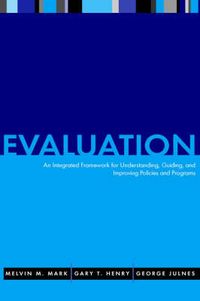
spara 40%
1 säljare
Evaluation: An Integrated Framework for Understanding, Guiding, and Improvi Upplaga 1
"This is one of the most coherent and comprehensive theories of evaluation yet formulated and one that makes a most valuable contribution. The authors are pioneering in important new directions."
--Ernest R. House, author of Professional Evaluation and Evaluating with Validity "This book is the best I've ever read detailing a practical theory of evaluation. It is comprehensive, beautifully written, and makes sense of the evaluation enterprise. It does so by emphasizing the major function of evaluation as sense-making about policies and programs."
--Thomas D. Cook, professor, sociology, psychology, education, and public policy, Northwestern UniversityPrograms that serve the needs of the public continually face changes brought by social, political, and economic forces. To survive these changes, organizations must evaluate their programs wisely and realistically. This book offers a new approach to evaluation, one that will encourage all kinds of organizations and agencies to improve their contributions to social betterment. The authors draw from three decades of evaluation practice and theory to present their own framework for conceptualizing evaluation and for pragmatically assessing social policies and programs.They analyze four purposes of evaluation:*To review the merit of programs and their value to society*To improve the organization and its services*To ensure program compliance with mandates*To build knowledge and expertise for future programsFor the practitioner, these purposes help define the approach and methods for an evaluation. The authors also enrich their discussion with four possible modes of inquiry: description, classification, causal analysis, and values inquiry. Filled with tables, charts, and figures, this resource invites organizations to make the most appropriate programming decisions based on thoughtful and systematic methods. Evaluation: An Integrated Framework for Understanding, Guiding, and Improving Policies and Programs is a tool that scholars can use to rejuvenate their view of evaluation and that practitioners can use to integrate the best techniques with a contemporary understanding of social policy and change.
Upplaga: 1a upplagan
Utgiven: 2000
ISBN: 9780787948023
Förlag: John Wiley & Sons
Format: Inbunden
Språk: Engelska
Sidor: 416 st
"This is one of the most coherent and comprehensive theories of evaluation yet formulated and one that makes a most valuable contribution. The authors are pioneering in important new directions."
--Ernest R. House, author of Professional Evaluation and Evaluating with Validity "This book is the best I've ever read detailing a practical theory of evaluation. It is comprehensive, beautifully written, and makes sense of the evaluation enterprise. It does so by emphasizing the major function of evaluation as sense-making about policies and programs."
--Thomas D. Cook, professor, sociology, psychology, education, and public policy, Northwestern UniversityPrograms that serve the needs of the public continually face changes brought by social, political, and economic forces. To survive these changes, organizations must evaluate their programs wisely and realistically. This book offers a new approach to evaluation, one that will encourage all kinds of organizations and agencies to improve their contributions to social betterment. The authors draw from three decades of evaluation practice and theory to present their own framework for conceptualizing evaluation and for pragmatically assessing social policies and programs.They analyze four purposes of evaluation:*To review the merit of programs and their value to society*To improve the organization and its services*To ensure program compliance with mandates*To build knowledge and expertise for future programsFor the practitioner, these purposes help define the approach and methods for an evaluation. The authors also enrich their discussion with four possible modes of inquiry: description, classification, causal analysis, and values inquiry. Filled with tables, charts, and figures, this resource invites organizations to make the most appropriate programming decisions based on thoughtful and systematic methods. Evaluation: An Integrated Framework for Understanding, Guiding, and Improving Policies and Programs is a tool that scholars can use to rejuvenate their view of evaluation and that practitioners can use to integrate the best techniques with a contemporary understanding of social policy and change.
Begagnad bok
425 kr698 krSpara 273 kr (40%) mot nypris
Fri frakt & skickas inom 1-3 vardagar
Köpskydd med Studentapan
Varje köp täcks av Studentapans köpskydd som säkerställer att boken kommer fram, att du får rätt bok och att skicket stämmer överens med beskrivning.



